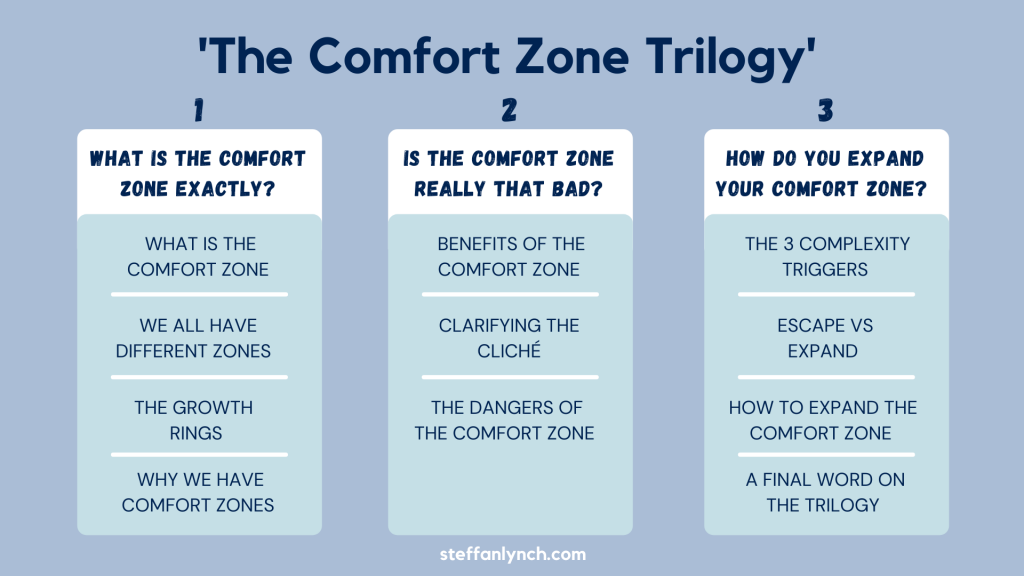Today is part three of my mini-series about the comfort zone. In my first post, we answered the question of ‘What Is The Comfort Zone Exactly?’, and we touched upon Bill Eckstrom’s Growth Rings theory. In my second post, ‘Is The Comfort Zone Really That Terrible?’, we delved deeper and considered its (limited) positives and many negatives.
Today, I’m bringing it full circle as we explore how to expand your comfort zone in the right way (#foreshadowing). This is all about pushing the boundaries of comfort into discomfort. It’s about forcing yourself to seek growth and leave stagnation and comfort behind.
But how do you do it?

Expanding VS Escaping The Comfort Zone
Before we jump into HOW to expand your comfort zone, let’s talk about the terminology. I’m talking about expanding, not escaping – the difference is important.
Escaping your comfort zone makes it sound like you’re running away and never looking back. That’s not the aim here. As you’ll remember from my second post, there’s a time and a place for our comfort zones.
It can help you relax, unwind, and feel safe. It can offer us a break from the chaos of everyday life. It can be a great place to operate for short periods of time; you can recharge your batteries and get yourself ready for further growth. That’s why I’m not talking about escaping the comfort zone; I’m just talking about expanding it.
The aim is to EXPAND your Comfort Zone; not escape it. You'll have to return to it at one point or another.
When you expand the comfort zone, you push yourself into the Complexity ring. Ultimately, what was once scary and uncomfortable becomes normal and comfortable.
Imagine the comfort zone as a ring around you. That ring expands slightly whenever you do a new activity or adopt a new approach to something. Whilst, at first, that will cause discomfort, you’ll eventually get comfortable with it. Congratulations, your comfort zone has expanded! From there? You just find a new task, make a new goal, and expand it again. That’s growth. That’s expanding your comfort zone, not escaping it.
And remember that the comfort zone is a good place to be sometimes. So by expanding it each time, you’re opening yourself up to new horizons to explore. When those horizons become comfortable, it’s time to find some new ones.
When you’re expanding your comfort zone, your growth has no limits. You permit yourself the opportunity for sustainable growth. Keep pushing yourself, keep triggering that complexity ring, and there’s no telling how far you’ll go with it. The sky is the limit.
But how do you go about expanding your own comfort zone?

1. Recognise What You Want From The Expansion
Growth without purpose isn’t a good idea. Changing how you do things, what you like, and who you are as a person on a whim simply for growth’s sake isn’t healthy. You’ll lose yourself in all the constant change. So, the very first thing you need to do is know what the aim of the comfort zone expansion is for you.
Take a look at your life right now. Which area is the most stagnant? Which part of your life is the part you most want to see a change in? Homelife? Your relationship? Your position at work? These are all broad areas where you might be feeling like you have more to give. Pick one for now, and focus your attention on this.
Let’s take work as an example (and I’ll run this as my prime example through my other points). Let’s say you’ve been working at the same company/business for a few years. You’re feeling unmotivated to get to work every day and give your all. You used to love it, and you wouldn’t want to move on – but something has gone awry. (meaning ‘away from the usual or expected course; amiss’).
Usually, that something is comfort – you’ve become too comfortable with it. It’s hard to feel motivated when your thoughts and actions in the workplace are like a broken record.
Recognising this is the first step.
2. Be Honest With Yourself And Stop Making Excuses
Once you’ve recognised the situation for what it is, it’s time to cut the excuses. It isn’t your boss’s fault, the customers, or the environment. What’s changed here is you. So, it’s time to force yourself to make a change.
This point applies to everybody looking to expand their comfort zone, not just the work example I created above. Suppose you’re stuck in any situation you once loved and felt exhilarated by. In that case, the hard part is cutting the excuses. It’s easy to blame others, the environment, and anything else you can think of. It takes the pressure off us. And if we’re being honest, it’s easy to take that route instead of facing the truth.
But to assume that everyone needs to ‘cut the excuses’ is ignorant. It negates the fact that there are, or could be, valid external factors that contribute to said condition. While it is imperative to focus on what you can control, I do feel it’s equally important to recognise the root of the problem in the first place. (Hint: It’s not always us)
‘Excuses’ imply that it is our fault, but that’s not always the case. It might not be your fault that you don’t enjoy being at home or aren’t doing well at work. It may be that your home does not have a healthy environment or your workplace hasn’t got a good culture. Yes, YOU may have to take things into your hands and be proactive, but it doesn’t mean it’s YOUR fault.
There is a difference between it being your responsibility and your fault.
What I'm trying to say is this:
If you want to expand that comfort zone, you’ll need to get honest with yourself. If you are making excuses, then recognise that and stop it. If it’s not your fault, then recognise that, but also recognise that it’s still your responsibility to do something about it. Then promise to make that change!
3. Make Discomfort Your Friend
Getting comfortable with discomfort isn’t easy. But once you’ve recognised the area you need to improve and have been honest with yourself, you’ve already taken the first step toward making discomfort your friend.
But recognising you’re part of the problem is only the first step – literally. Now you need to dive right in and make it your best bud!
You need to strip all of your thoughts and behaviours right back. Examine every single one under the microscope of discomfort. Only then can you truly see where you can progress.
Let’s jump back to the work example…
Let’s say for years, you’ve started every single day by checking your work emails, firing off meaningless replies, and creating a quick to-do list. And you approach each one in the exact same way at the exact same time each day. When you look at each behaviour and thought throughout the day, you see where you’re going wrong.
Work is no longer exciting for you because it’s become a routine. A habit. Comfortable. Take just one of those behaviours. Imagine that the next day, you go in, and you start your day completely differently. Before checking your emails, you head to a coworker about one of your tasks and ask how they do it differently. They tell you, and you promise to do that task their way today to see what happens.
Starting your day that way might cause discomfort – and that’s exactly what you want!
4. Do Something, Anything, Differently
But you guessed it – thinking about it will not make a difference. Expanding your comfort zone requires just one key thing from you: action.
So, in the work example, you’d do exactly that. And when you sit down to create that spreadsheet, you try it your coworker’s way. What’s the worst that could happen?

Maybe it’s a trickier way of making it, and you vow not to bother with that technique again? But hey, you tried it; you learned how to approach it differently, and you gave it a shot. That’s the worst that could happen.
But you know what? It might also teach you something new. It might encourage you to stop making the spreadsheet your way every day but try fresh approaches to find a more efficient way of doing it. Once you’ve done that, it frees up more time in your day. Maybe then you ask your boss for more tasks to keep you occupied. After that, your boss sees a new you, someone willing to push the boat, try new things, and make themselves an asset. Where could that lead you? Promotions? Definitely. A new dream for a new job elsewhere? Why not!
The point I’m trying to make here, no matter what area of your life, is that growth breeds growth. You push yourself once, in any small way, and you’ll taste it. Approach something, anything, differently, and you’ll learn something new, feel something new. And that might be all it takes for you to operate just outside your comfort zone and expand it a little more each day.
5. Don't Take Yourself Too Seriously
My last point is perhaps the most important of them all. It can be so easy to feel that discomfort, see a negative result, and run back to that safety net of the comfort zone. But there’s a way to combat this.
And all it takes is for you to go easy on yourself. Where there’s growth potential, there’s always a risk. Always. There’s a risk of failure, something not going the way you planned. There’s even risk in something going the way you planned, leading to an unexpected outcome afterwards.
This. Is. Good.
Trust me, it's good to fail, operate in the unexpected, and allow unpredictable outcomes to come your way. That's what expanding your comfort zone is.
Let’s take one last look at the work example. Let’s say you do the spreadsheet your coworker’s way, and your boss says your numbers are wrong. You’d send an email back, apologise, and start from scratch doing your spreadsheet the old way.
OR, you could laugh. Laugh at the situation for what it is. Clearly, you tried it your coworkers’ way, and you messed up somewhere. So, laugh it off, and go grab your coworker. Ask if they can look over your spreadsheet and explain where you went wrong. You can laugh at it together – but the chances are you’ll also learn something. And that’s growth.
So, if you want to be successful at expanding your comfort zone, the secret is not to take yourself too seriously. Because ultimately, that’s the best way to get comfortable with discomfort and force yourself into situations that help you grow.
And that’s the beauty of expanding your comfort zone – we can all do it, so long as we go easy on ourselves and allow ourselves the opportunity to grow in a self-supportive way.



